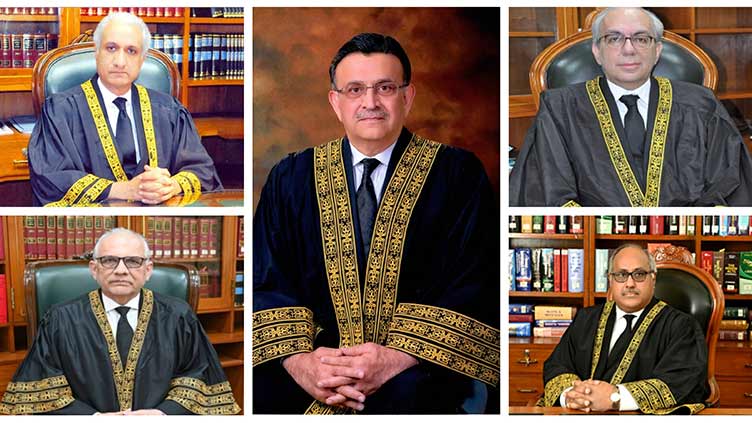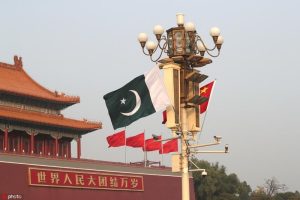ISLAMABAD – A five-judge larger bench of the Supreme Court on Friday reserved its verdict on petitions filed against the formation of a judicial inquiry commission, led by senior puisne Judge Justice Qazi Faez Isa.
The larger bench, headed by Chief Justice of Pakistan (CJP) Bandial and comprising Justices Ijazul Ahsan, Munib Akhtar, Syed Hassan Azhar Rizvi, and Shahid Waheed, reserved the ruling after hearing arguments from Attorney General for Pakistan Mansoor Usman Awam, Supreme Court Bar Association’s lawyer and others.
At the outset of the hearing, the AGP raised objections to the bench, asking the chief justice to excuse himself from the bench.
Responding to the AGP, the chief justice asked if he meant for him to leave the bench, adding: “You should not interfere with our administrative authority.”
CJP Bandial said he knew that this objection would be raised, adding that the judiciary was not subservient to the government.
Talking about audio leaks commission, he remarked the government took the decision in haste, adding that it was an attempt to create a rift among judges of the top court. He highlighted that the inquiry commission’s formation was in conflict with Article 209 and the judiciary’s powers.
At one point, the SC’s bar association lawyer said the government should have consultation with the chief justice before forming the commission involving judges.
Later, the bench wrapped up the hearing, stating a short order will be issued later today.
The federal government had formed a three-member judicial commission on May 20 to investigate the audio leaks related to judges. The commission includes Justice Qazi Faez Isa, Balochistan High Court Chief Justice Naeem Akhtar Afghan, and Islamabad High Court Chief Justice Aamer Farooq. The commission, headed by Justice Isa, aims to address concerns raised by the federal government regarding controversial audio leaks involving a former Chief Justice of Pakistan and conversations about judges that raise questions about their impartiality.
Various petitions have been filed challenging the formation of the judicial commission. The Pakistan Tehreek-e-Insaf (PTI) filed a constitutional petition in the Supreme Court, urging the nullification of the notification forming the commission. The petition argued that the Chief Justice of Pakistan’s permission is required to nominate judges for the commission, and the Supreme Judicial Council is the only forum for investigating or proceeding against a judge.
Additionally, the President of the Supreme Court Bar Association (SCBA), Abid Zuberi, filed a petition against the commission, claiming that it violates articles 9, 14, 18, 19, and 25 of the Constitution. The petition highlighted that the Constitution does not permit the tapping of citizens’ cell phones and questioned how the commission could issue an order without knowing the source of the audio recordings. It further argued that the commission’s formation interfered with the affairs of the Supreme Judicial Council and alleged that the audio leaks were an attempt to influence the Supreme Court.
The petitions reflect the legal challenges and concerns surrounding the judicial inquiry commission and its proceedings. As the larger bench commences hearings today, the court will carefully consider the arguments presented and make decisions regarding the commission’s formation and its mandate to investigate the audio leaks involving members of the judiciary.
Pakistan Army takes ex-PTI MPA among 16 into custody for trial after Jinnah House attack














